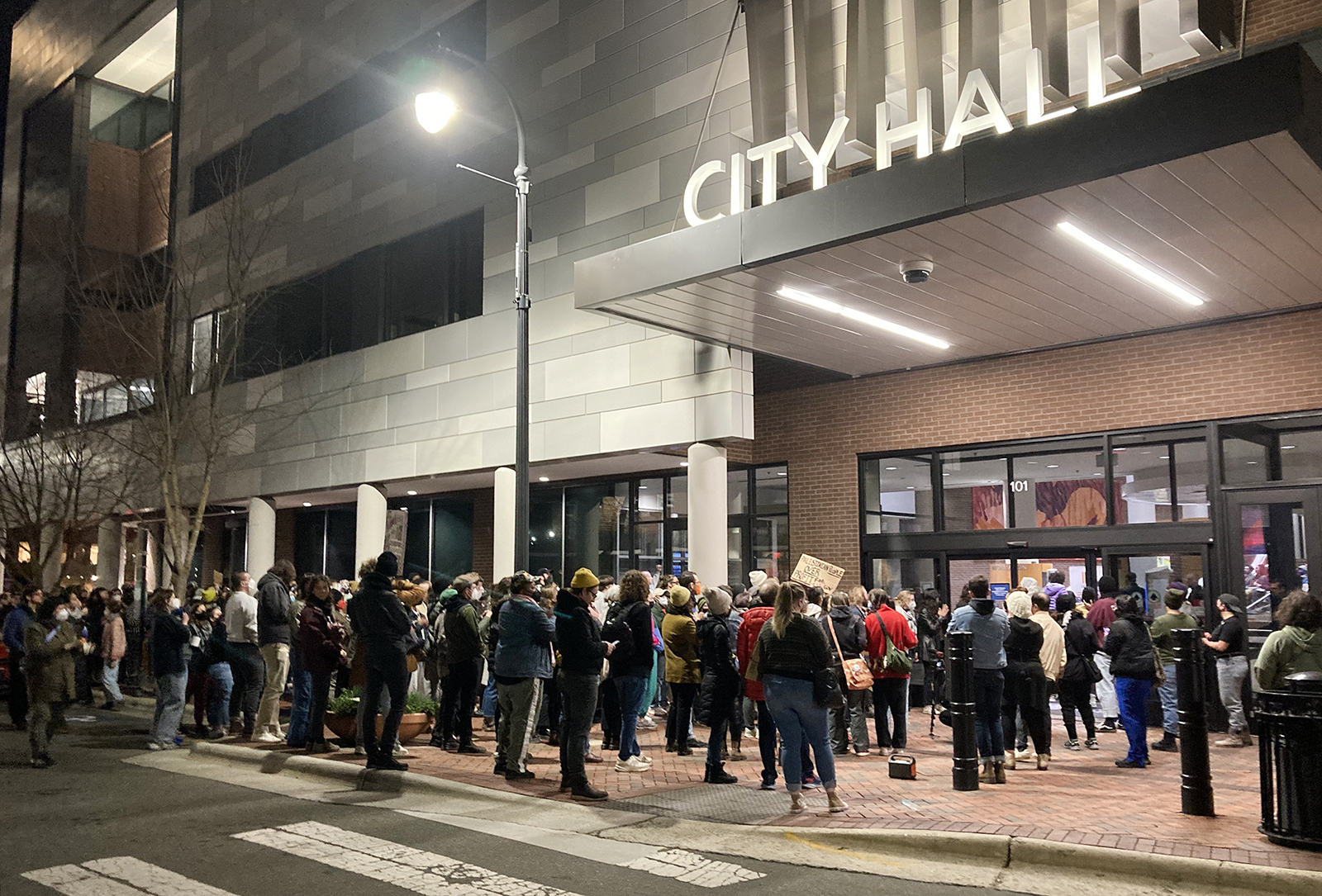DURHAM, N.C. (RNS) — Well after midnight Monday (Feb. 19), after almost four hours of passionate, and often fiery, public testimony, the Durham City Council passed a resolution supporting an end to the Israel-Hamas war and urging the Biden administration to call for a bilateral cease-fire.
The 5-2 vote on the resolution was a response to a surge of protests against Israel’s four-month military assault on the Gaza Strip, by Durham residents mostly in defense of Palestinians, about 29,000 of whom have been killed by Israeli forces.
Durham, with Chapel Hill and Raleigh part of the liberal-leaning Research Triangle area of the state, is the second city in North Carolina that has voted for a cease-fire resolution. The nearby city of Carrboro also adopted a cease-fire resolution, while Raleigh and Chapel Hill leaders have declined to consider resolutions due to lack of consensus.
Durham became the 69th city nationwide to pass such a resolution, joining Chicago, Minneapolis, Detroit and Seattle, as well as President Joe Biden’s longtime home, Wilmington, Delaware.
On Tuesday, the United States vetoed a widely supported U.N. resolution demanding an immediate humanitarian cease-fire in the war, the third such veto in three months.
In Durham, about 200 people stood outside City Hall for hours Monday evening before being allowed into the council chambers. Many wore the kaffiyeh, the distinctive checked headscarf worn by Middle Eastern men and associated with the Palestinian cause. Some in the crowd paired the scarf with a yarmulke. They held up posters in the red, green, black and white of the Palestinian flag.
They also clutched clementines, which they raised as a sign of solidarity with 3-year-old Imad Abu Al-Qare’a, who was reportedly killed by Israeli snipers in December after he ventured out with his 20-year-old cousin to buy clementines from a street vendor.
Fifty people had signed up to speak to council members, either in person or online.
“I’m devastated and angry that my government is using my tax dollars to fund Israel’s bloody and disproportionate retribution,” said Elizabeth Johnson of Durham, a member of Mennonite Action, in her public comments. “We should not be providing unconditional funding to a government actively under investigation for perpetuating genocide in violation of international law.”
Several council members, who had met for weeks in facilitated small groups to draft the resolution, ultimately agreed, saying the council vote, which is not likely to affect White House policy on the war, was an acknowledgment of their constituents’ opposition to U.S. policy on Israel and its financial support for the country’s war in Gaza.

Protesters gather outside City Hall on Feb. 19, 2023, in Durham, N.C. (RNS photo/Yonat Shimron)
“The people of Durham are not OK with the trajectory of our federal government. I think that is important, and that is why I have put this resolution in front of you today,” said the resolution’s author, council member Chelsea Cook, who is Jewish.
RELATED: Peace pilgrimage takes up war in Gaza as a civil rights issue
Mayor Leonardo Williams voted against the resolution, saying he feared it might divide the city’s nearly 300,000 residents. Mayor Pro Tem Mark-Anthony Middleton also opposed the resolution.
A handful of Jews wearing scarves with the blue-and-white Israeli flag vehemently opposed the resolution, charging that it would only fuel antisemitism and endanger Jews. They noted that the resolution omits any mention of Hamas, the militant group that infiltrated Israel’s southern border and killed 1,200 Israelis on Oct. 7, precipitating Israel’s assault on Gaza.
“This is another ‘Blame the Jews’ situation, even though Hamas is ultimately responsible for what’s going on,” said Amy Rosenthal, a member of the North Carolina Coalition for Israel.
But Sandra Korn, an activist with the Triangle chapter of Jewish Voice for Peace, disagreed.
“For us, it’s really clear that Jewish safety and Palestinian safety are connected,” said Korn, who is Jewish. “Ending Israel’s occupation will make Jewish people and Palestinian people more safe.”
Like many of the Jewish Voice for Peace activists who came to the meeting in black T-shirts with the slogans “Not in our name” and “Jews say ceasefire now,” Korn identified as anti-Zionist. The label has been used to signal opposition to the policies of the Israeli government and to the idea of an ethno-nationalist state that privileges Jews.
Jewish Voice for Peace has been a leader in urging cease-fire resolutions. The 28-year-old organization has 80 local chapters across the country and 24,000 dues-paying members.
Last month, the International Court of Justice in The Hague ordered Israel to do all it can to prevent death, destruction and any acts of genocide in its campaign in Gaza.
Liberal Jews were not the only ones pushing for the Durham resolution. A broad coalition that included local chapters of several trade unions backed the resolution.
C. Phifer Nicholson Jr., a medical student at Duke University who holds a master’s in theological studies from Duke Divinity School, said he felt he needed to show up to support the resolution.
“The way that I experience my Christianity is one that it’s tied directly to movements of justice and liberation,” said Nicholson, who spent part of 2018-19 in the West Bank city of Ramallah. “It seems like the least that you can do, to show up as a part of your city and try to represent and push for a voice of solidarity with people who are suffering.”
Several said they thought the resolution did not go far enough, and one council member called for an amendment to include the word “genocide.” Residents cheered the call, drawing the most sustained applause of the evening. The mayor said the council would not take up any amendments.
RELATED: African Methodist Episcopal Church leaders call for halt to all US funding of Israel
Discover more from CaveNews Times
Subscribe to get the latest posts sent to your email.


























![Exploring the Serene Beauty of Nature: A Reflection on [YouTube video title]](https://cavemangardens.art/storage/2024/04/114803-exploring-the-serene-beauty-of-nature-a-reflection-on-youtube-video-title-360x180.jpg)


























